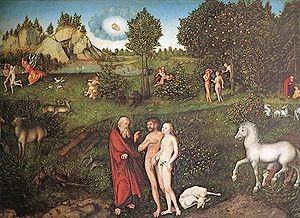Contents
5.1 The Text
The modern division of the Bible into chapters dates from about AD 1200, and the division into verses somewhat later; the distinction between Genesis 1 and 2 is therefore a relatively recent development.
First account – “Creation week”
The creation week narrative consists of eight divine commands executed over six days, followed by a seventh day of rest: “When God began to create heaven and earth, and the earth then was welter and waste and darkness over the deep and God’s breath hovering over the waters, God said, ‘Let there be light.’ and there was light”
- First day: God creates light (“Let there be light!”) – The first divine command. The light is divided from the darkness, and “day” and “night” are named.
- Second day: God creates a firmament (“Let a firmament be…!”) – The second command -to divide the waters above from the waters below. The firmament is named “heavens”.
- Third day: God commands the waters below to be gathered together in one place, and dry land to appear (the third command). “Earth” and “sea” are named. God commands the earth to bring forth grass, plants, and fruit-bearing trees (the fourth command).
- Fourth day: God creates lights in the firmament (the fifth command) to separate light from darkness and to mark days, seasons and years. Two great lights are made (most likely the Sun and Moon, but not named), and the stars.
- Fifth day: God commands the sea to “teem with living creatures”, and birds to fly across the heavens (sixth command); He creates birds and sea creatures, and commands them to be fruitful and multiply.
- Sixth day: God commands the land to bring forth living creatures (seventh command); He makes wild beasts, livestock and reptiles. He then creates Man and Woman in His “image” and “likeness” (eighth command). They are told to “be fruitful, and multiply, and fill the earth, and subdue it.” Humans and animals are given plants to eat. The totality of creation is described by God as “very good.”
- Seventh day: God, having completed the heavens and the earth, rests from His work, and blesses and sanctifies the seventh day.
Second account (Eden narrative)

The Eden narrative addresses the creation of the first man and woman:
- Genesis 2:4b -the second half of the bridge formed by the “generations” formula, and the beginning of the Eden narrative- places the events of the narrative “in the day when YHWH Elohim made the earth and the heavens…”
- Before any plant had appeared, before any rain had fallen, while a mist watered the earth, Yahweh formed the man (Hebrew ha-adam הָאָדָם) out of dust from the ground (Hebrew ha-adamah הָאֲדָמָה), and breathed the breath of life into his nostrils. And the man became a “living being” (Hebrew nephesh).
- Yahweh planted a garden in Eden and he set the man in it. He caused pleasant trees to spout from the ground, and trees necessary for food, also the tree of life and the tree of knowledge of good and evil. (An unnamed river is described: it goes out from Eden to water the garden, after which it parts into four named streams.) He takes the man who is to tend His garden and tells him he may eat of the fruit of all the trees except the tree of the knowledge of good and evil, “for in that day thou shalt surely die.”
- Yahweh resolved to make a “helper” suitable for the man. He made domestic animals and birds, and the man gave them their names, but none of them is a fitting helper. Therefore Yahweh caused the man to sleep, and he took a rib, and from it formed a woman. The man then named her “Woman” (Hebrew ishah), saying “for from a man (Hebrew ish) has this been taken.” A statement instituting marriage follows: “Therefore shall a man leave his father and his mother, and shall cleave unto his wife: and they shall be one flesh.”
- The man and his wife were naked, and felt no shame.
Genesis 1-11 – the “Primeval History”
Genesis 1-2 opens the “primeval history” of Genesis 1-11. This unit within Genesis forms an introduction to the stories of Abraham and the Patriarchs, and contains the first mention of many themes which are continued throughout the book of Genesis and the Torah, including fruitfulness, God’s election of Israel, and His ongoing forgiveness of man’s rebellious nature. It is therefore impossible to understand either Genesis 1-2 or the Torah as a whole without reference to this introductory history.


Be First to Comment